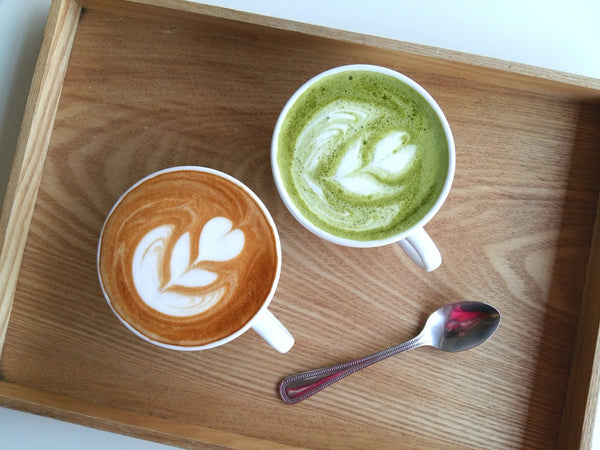Sleep is one of the most important aspects of health, yet it can be hard to come by sometimes. Busy schedules, kids, stress, and technology can all prevent us from getting enough quality sleep. While many factors and lifestyle behaviors play a role in sleep health, one way to get better sleep may be to make the switch from coffee to matcha.

Sleep is important for just about every system in our body. It’s necessary for emotional well-being, cognitive function, weight management, hormone regulation, immunity, blood pressure, physical performance, and more. Health experts identify three interconnected pillars of health and well-being:
- Sleep
- Nutrition
- Physical exercise
Achieving optimal health necessitates nurturing all three of these pillars, with sleep arguably exerting the most profound influence on the others. For example, if you aren’t getting enough sleep, you may crave simple carbohydrates such as cakes and cookies as a way to wake yourself up. If you’re tired, it’s also tough to get motivated for a workout. Not getting enough sleep has a huge impact on all aspects of health and may be one of the most important areas to concentrate on if you’re looking to improve health.
Which may lead you to ask, how much sleep do you really need? This varies from person to person and also changes as we age. On average, an adult needs seven to nine hours of sleep each night. But it’s not just the number of hours we need to feel our best; sleep quality is also incredibly important.
Sleep is SO important that not getting enough sleep has been linked to seven out of the 15 leading causes of death worldwide. With sleep being so important, why is it that we just can’t seem to get enough? Bad sleep hygiene, stress and anxiety, children, and caffeine can all play a role. While we don’t have control over all of these factors, we can modify our caffeine intake and choose better sources of it!

Although exhaustion may tempt you to reach for a cup of coffee (or three), opting for matcha offers more benefits for sleep health. Compared to coffee, matcha has a better impact on sleep health as it contains the calming amino acid L-theanine and has the ability to improve general health and reduce stress and anxiety.
Keep reading to find out the top reasons why drinking matcha is better for sleep health than coffee.
L-Theanine reduces stress

Matcha is unique for its high content of L-theanine, an amino acid that promotes relaxation and reduces stress. Studies indicate that L-theanine can increase the neurotransmitters GABA, dopamine, and serotonin, which can help you feel calm and relaxed and lower overall feelings of stress and anxiety. This is important as both stress and anxiety can interfere with the ability to fall asleep and stay asleep.
Matcha is a concentrated source of L-theanine. Especially compared to coffee, which contains none of this relaxing amino acid.
Reduced caffeine
Caffeine is a stimulant that helps keep us awake, which is why when you’re tired, you may crave that immediate boost of energy. The problem is that when you’re ready to go to sleep, you can still have caffeine in your system, which may interfere with falling asleep. This can become an endless cycle—reaching for a cup of coffee when you’re tired and then not being able to sleep because you had too much coffee.
On average, a cup of matcha contains about 40-70 mg of caffeine, whereas a cup of coffee contains 100-120 mg of caffeine. This difference in caffeine may make all the difference. While matcha helps you feel awake and focused, the reduction in caffeine is helpful for when it’s time to go to sleep as your body has less to clear.
Coffee also gives you short bursts of energy, often leaving you needing another cup of coffee. Comparatively, matcha gives you a much longer energized feeling, so you won’t “need” that second cup. This means that when you’re ready to fall asleep at night, you won’t be fighting that afternoon caffeine rush.
Different ways the body processes caffeine
One of the reasons matcha is a better option than coffee for sleep health is that our body processes the caffeine in matcha a bit differently than coffee. This is important because rather than feeling a jolt of energy with a subsequent crash, matcha gives you long-lasting, jitter-free energy. This keeps your mood and energy levels steady and can allow you to get a better night’s sleep at the end of the day. It also means you have to drink less caffeine in order to feel awake and alert.
About 99% of coffee's caffeine is absorbed by the body and can reach peak blood concentration levels about 15 minutes after intake. L-theanine slows down caffeine absorption, so matcha’s effects can last up to 6 hours. The crash that so many people report when drinking coffee doesn’t tend to happen with matcha.
L-theanine also helps to counteract any negative side effects of caffeine, such as feeling jittery and anxious. This can help you avoid any sleep-disrupting side effects you may notice with coffee.
If you’re looking for a great night’s sleep, however, we do recommend setting aside any caffeine after 2:00 pm.
Improved mental health

Matcha is high in antioxidants as well as other nutrients and anti-inflammatory properties that can contribute to mood-boosting benefits. One antioxidant in particular, known as EGCG, is thought to help make people happier and may also improve memory. L-theanine also has a positive impact on mood thanks to its calming effects and ability to boost certain neurotransmitters. Your mood and overall mental state have a big impact on sleep and vice versa. In fact, studies show that sleep disorders and mood disorders are closely linked. Anxiety and stress can increase heart rate and cause shallow, rapid breathing- the exact opposite of what’s needed in order to fall asleep.
Bottom Line: Matcha makes a difference when it comes to sleep
Sleep is incredibly important for overall health, and yet it’s something many of us struggle with. Waking up exhausted can lead you to grab multiple cups of coffee, which often perpetuates the cycle of sleeplessness. Matcha makes for a better alternative because it’s a cleaner, jitter-free energy source and has relaxing properties such as L-theanine. These can help improve mood, allowing you to get a better night’s sleep. Try swapping out your next cup of coffee for a matcha and see the difference for yourself.
Disclaimer: These statements in this blog post have not been evaluated by the Food and Drug Administration. The information provided here is for educational purposes only and should not be considered medical advice. It's essential to consult with a qualified healthcare professional before making any dietary or lifestyle changes.
References:
Alotaibi AD, Alosaimi FM, Alajlan AA, Bin Abdulrahman KA. The relationship between sleep quality, stress, and academic performance among medical students. J Family Community Med. 2020 Jan-Apr;27(1):23-28. doi: 10.4103/jfcm.JFCM_132_19. Epub 2020 Jan 13. PMID: 32030075; PMCID: PMC6984036.
Dietz, C., & Dekker, M. (2017). Effect of Green Tea Phytochemicals on Mood and Cognition. Current pharmaceutical design, 23(19), 2876–2905. https://doi.org/10.2174/1381612823666170105151800
Gardiner C, Weakley J, Burke LM, Roach GD, Sargent C, Maniar N, Townshend A, Halson SL. The effect of caffeine on subsequent sleep: A systematic review and meta-analysis. Sleep Med Rev. 2023 Jun;69:101764. doi: 10.1016/j.smrv.2023.101764. Epub 2023 Feb 6. PMID: 36870101.
Hidese S, Ogawa S, Ota M, Ishida I, Yasukawa Z, Ozeki M, Kunugi H. Effects of L-Theanine Administration on Stress-Related Symptoms and Cognitive Functions in Healthy Adults: A Randomized Controlled Trial. Nutrients. 2019 Oct 3;11(10):2362. doi: 10.3390/nu11102362. PMID: 31623400; PMCID: PMC6836118.







